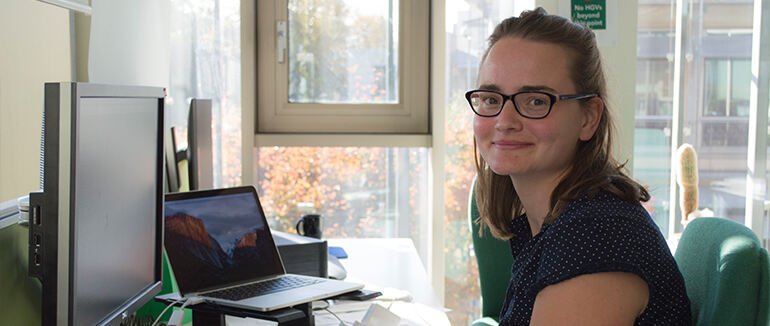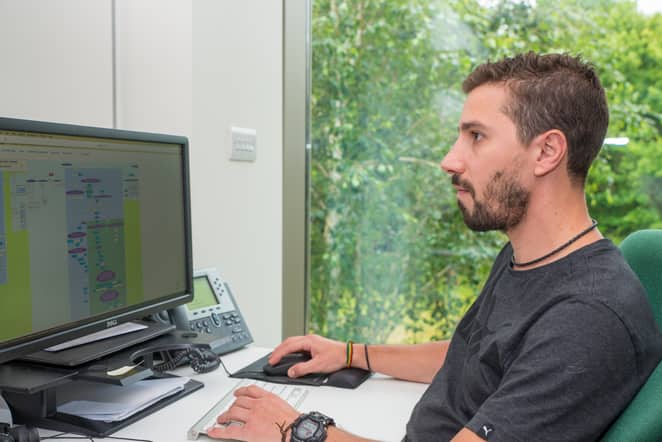
With more systems becoming networked, cybersecurity is growing to be increasingly important. There are many different aspects of cyber-security, and for this position we focus on special environments, such as IoT devices, the connected vehicles, and systems with societal importance. The work includes investigation and evaluation of security mechanisms such as intrusion detection systems and how to create resilient designs and architectures, i.e. systems that not only detect deviations from normal behavior but also would be able to report more specifically what is wrong and use additional information to mitigate potential problems and continue to work.
Information about the department
The Department of Computer Science and Engineering is a joint department at Chalmers University of Technology and the University of Gothenburg, with activities on two campuses in the city of Gothenburg. The department has around 270 employees from over 30 countries.
Our research has a wide span, from theoretical foundations to applied systems development. We provide high quality education at Bachelor's, Master's and graduate levels, offering over 120 courses each year. We also have extensive national and international collaborations with academia, industry and society.
Major responsibilities
Your main responsibility as a PhD student is to pursue your doctoral studies within the framework of the outlined research project. You will be enrolled in a graduate program in the Department of Computer Science and Engineering. You are expected to develop your own ideas and communicate scientific results orally as well as in written form. In addition, the position includes 20% departmental work, mostly as a teaching assistant in Chalmers' undergraduate and masters-level courses or performing other departmental tasks. You will work closely with supervisors in security for system design and development, followed by empirical evaluation to be submitted to academic conferences and journals.
The exact work tasks can be adopted to you and your profile, but research questions can span from system-oriented approaches in understanding under what conditions information is collected and if this collection can be made richer, to algorithmic questions with inspirations from explainable AI to involve investigating transparent and understandable white box mechanisms that complement the expert rather than black-box stand-alone systems.
Contract terms
Full-time temporary employment. The position is limited to a maximum of 5 years. During this time you are expected to obtain a PhD degree. This encompasses 20% departmental duties (typically teaching), 20% studies for credits towards your PhD and 60% research.
Qualifications
To qualify for this PhD student position you must have a master's level degree corresponding to at least 240 higher education credits in Computer Science or Computer Engineering or in a related field, with a good foundation in computer architecture. As a person, you are empathetic, loyal and have high ethical standards. You are also highly motivated, energetic, independent and have the ability to find solutions to complex problems.
Since the research work involves hardware design and development of simulation models, good hardware design and programming skills are required. It is meritorious if you have taken courses in operating systems and compilers.
The position requires sound verbal and written communication skills in English. Swedish is not a requirement but Chalmers offers Swedish courses.
We offer
Chalmers offers a cultivating and inspiring working environment in the coastal city of Gothenburg.
Read more about working at Chalmers and our benefits for employees.
Chalmers aims to actively improve our gender balance. We work broadly with equality projects, for example the GENIE Initiative on gender equality for excellence. Equality and diversity are substantial foundations in all activities at Chalmers.
Application procedure
The application should be marked with Ref 20210610 and written in English.
The application should be sent electronically and be attached as pdf-files, as below:
CV: (Please name the document: CV, Family name, Ref. number)
• CV
• Other, for example previous employments or leadership qualifications and positions of trust.
• Two references that we can contact.
Personal letter: (Please name the document as: Personal letter, Family name, Ref. number)
1-3 pages where you:
• Introduce yourself
• Describe your previous experience of relevance for the position (e.g. education, thesis work and, if applicable, any other research activities)
• Describe your future goals and future research focus
Other documents:
• Copies of bachelor and/or master’s thesis.
• Attested copies and transcripts of completed education, grades and other certificates, e.g. TOEFL test results.
Please use the button at the foot of the page to reach the application form. The files may be compressed (zipped).
Application deadline: 13 February, 2022
For questions, please contact:
Magnus Almgren, Networks and Systems
Email: magnus.almgren@chalmers.se
Phone: +46-31-772-11111111
Tomas Olovsson, Networks and Systems
Email: tomas.olovsson@chalmers.se
Phone: +46-31-772-1688
*** Chalmers declines to consider all offers of further announcement publishing or other types of support for the recruiting process in connection with this position. ***
Chalmers University of Technology conducts research and education in engineering sciences, architecture, technology-related mathematical sciences, natural and nautical sciences, working in close collaboration with industry and society. The strategy for scientific excellence focuses on our six Areas of Advance; Energy, Health Engineering, Information and Communication Technology, Materials Science, Production and Transport. The aim is to make an active contribution to a sustainable future using the basic sciences as a foundation and innovation and entrepreneurship as the central driving forces. Chalmers has around 11,000 students and 3,000 employees. New knowledge and improved technology have characterised Chalmers since its foundation in 1829, completely in accordance with the will of William Chalmers and his motto: Avancez!
URL to this pagehttps://www.chalmers.se/en/about-chalmers/Working-at-Chalmers/Vacancies/Pages/default.aspx?rmpage=job&rmjob=10100&rmlang=UK
Apply



